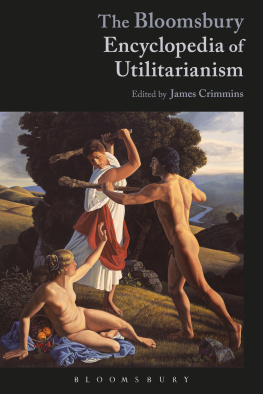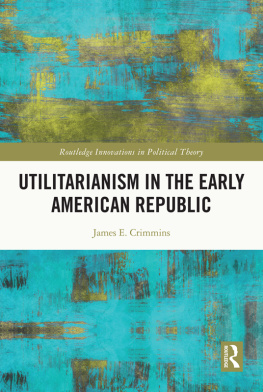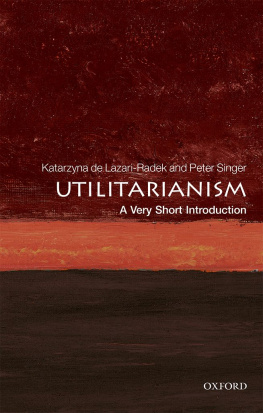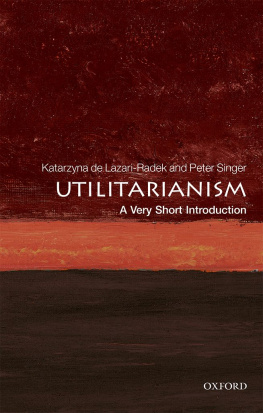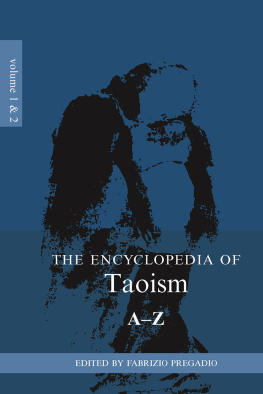The Bloomsbury Encyclopedia of Utilitarianism
Also available from Bloomsbury
Biographical Encyclopedia of British Idealism, edited by William Sweet
Dictionary of Early American Philosophers, edited by John R. Shook
Dictionary of Eighteenth-Century German Philosophers, edited by Heiner F. Klemme & Manfred Kuehn
Dictionary of Modern American Philosophers, edited by John R. Shook
Dictionary of Seventeenth-Century British Philosophers, edited by John W. Yolton, John Valdimir Price & John Stephens
Dictionary of Seventeenth and Eighteenth-Century Dutch Philosophers, edited by Wiep van Bunge, Henri Krop, Bart Leeuwenburgh, Han van Ruler, Paul Schuurman, & Michiel Wielema
Dictionary of Seventeenth-Century French Philosophers, edited by Luc Foisneau
The Biographical Encyclopedia of Islamic Philosophy, edited by Oliver Leaman
The Bloomsbury Encyclopedia of Philosophers in America, edited by John R. Shook
The Bloomsbury Encyclopedia of the American Enlightenment, edited by Mark G. Spencer
The Bloomsbury Encyclopedia of Utilitarianism, edited by James E. Crimmins
Utilitarians and their Critics in America 1789-1914, edited by James E. Crimmins & Mark G. Spencer
The Bloomsbury Encyclopedia of Utilitarianism
EDITED BY
James E. Crimmins
Bloomsbury Academic
An imprint of Bloomsbury Publishing Plc

CONTENTS
EDITOR
James E. Crimmins
EDITORIAL COMMITTEE
Douglas G. Long, The University of Western Ontario
Terence Ball, Arizona State University
Samantha Brennan, The University of Western Ontario
Brad Hooker, University of Reading
David Lieberman, University of California, Berkeley
Philip Schofield, University College London
Anthony Skelton, The University of Western Ontario
L. Wayne Sumner, University of Toronto
PROJECT ADMINISTRATOR
Isaac Quinn DuPont
Jeremy Bentham coined the term utilitarian in 1781, but the idea of utility as a value, goal or principle in moral, political, and economic life has a long and rich history. That history may be said to begin with the reflections of ancient philosophers on the place of the utile in human life. Thereafter, the noun utilitas passed through pagan, theological and secularized stages of usage, and divergent understandings of the meaning of utility emerged. When it came to be adapted for use in a variety of professionalized legal, philosophical, political, and economic contexts, utilitariansmost notably Bentham and his followersinsisted on the intrinsic unity of theory and practice in a utilitarian praxis. In each of these fields, different problems and issues of interpretation and application were thrown up, and different intellectual casts of characters joined battle to validate or disqualify the utilitarian approach to their subject or to the sphere of human activities in which they were interested.
This encyclopedia is an attempt to capture the complex history and the multifaceted character of utilitarianism in its various contexts and forms more completely than any previous source. Studies of utilitarianism hitherto have been notably compartmentalized, focusing on ethics, the sociopolitical utilitarianism epitomized in Benthamism, the genesis of Austinian jurisprudence, Millian revisionism, and more recent adaptations, applications, and debates. The present volume has a far broader mandate. Here, the reader will find entries on the authors and texts that contributed to the development of the tradition of utilitarian thinking from antiquity to the present, as well as on the issues and critics that have arisen at every stage in the history of that tradition. The reader will discover, too, ample evidence of the capacity of the theory to generate new ideas, issues, and approaches, and to foster dialogue across an expansive and eclectic intellectual spectrum, embracing the history of ideas, moral, legal, analytic, and political philosophy, economics, religion, psychology, and other fields of study.
The statistically inclined might wish to quantify the level of interest in these domains and across periods of time. However, for those more disposed to visual depiction, we might imagine the utilitarian tradition as an ancient but still living tree. From its roots in antiquity, it has grown over the centuries, cross-fertilized with other ideational traditions drawn from natural philosophy, humanism, and the sciences, and formed a dense and unyielding trunk from which new branches continue to sprout and foliage blooms. From time to time, the organism has been buffeted by the contending winds of competing theories, and there have been occasional attempts to take an axe to the entire extraordinary structure. But, like one of Tasmania's arched and pendulous Huon pines, utilitarianism has withstood the test of time, and there is good reason to expect that it will continue to flourish long into the future, putting the lie to Bernard Williams imprudent prediction in 1973 that the day cannot be too far off in which we hear no more of it.
There are over 220 entries in the encyclopedia, authored by some 120 scholars from all parts of the globe. Many more entries might have been included, and undoubtedly the critic will find reason to quibble with the final list of contents: such and such a topic surely warranted inclusion and how could the editor omit this philosopher or that. All I can say is that settling the final lineup of entries was no easy matter. The aim was to be as comprehensive and relevant as possible, while giving important subjects enough room for authors to do them justice. Necessarily, the limitations of space have determined that certain topics, historical figures and contemporary scholars did not make the editorial cut. I wish it could have been otherwise.
It would be presumptuous to attempt to summarize the multifarious contents of this volume. However, a cursory overview will provide the reader with a suggestive guide. Naturally, many historical figures occupy these pages, from Plato, Aristotle, Epicurus, and Confucius, and later progenitors of the theory like Richard Cumberland, the Earl of Shaftesbury, Joseph Butler, John Gay, David Hartley, Francis Hutcheson, David Hume, Claude Adrien Helvtius, Cesare Beccaria, Joseph Priestley, William Godwin, and William Paley, to the classical utilitarians, Bentham, the Mills and Sidgwick, and more recent contributors to the utilitarian tradition like J. J. C. Smart, John Harsanyi, James Griffin, Shelly Kagan, Peter Singer, and Brad Hooker. Among the political economists, the reader will find Adam Smith, Thomas Malthus, David Ricardo, Jean-Baptiste Say, the Physiocrats, F. Y. Edgeworth, William Stanley Jevons, Alfred Marshall, Arthur Cecil Pigou, and Lionel Robbins. Legal scholars and jurists include John Austin, H. L. A. Hart, and the Americans David Hoffman, John Codman Hurd, and Oliver Wendell Holmes. Major critics are also featured, such as Thomas Carlyle, Thomas Babington Macaulay, William Whewell, the Idealists, Friedrich Hayek, Bernard Williams, John Rawls, Robert Nozick, David Gauthier, and Derek Parfit. Among the lesser lights in the utilitarian orbit, the reader will find the Cambridge utilitarians George and John Grote, John Fawcett, Joseph B. Mayor, and John Rickards Mozley, and Americans like Thomas Cooper, Richard Livingston, John Neal, Richard Hildreth, and John L. OSullivan. A number of historians and commentators on the utilitarian tradition have been included, notably Leslie Stephen and Elie Halvy. Related schools of thought and theories are represented, including Evolutionary Theory, Game Theory, Public Choice Theory, Pragmatism, Preferentialism, and Welfarism, as are important aspects of contemporary discussions such as Arrow's Theorem, the Expected Utility Hypothesis, the Pareto Principle, and Rational Choice. The many forms of utilitarianism include Act, Aggregate, Analog, Average, Binary, Collective, Critical-Level, Expectabilist, Ideal, Indirect, Motive, Number-dampened, Objective, Philosophical, Rule, Scalar, Subjective, Total, Valence, and Virtue utilitarianism. Key concepts and issues discussed include Adjudication, Agency, Animals, Associationism, Autonomy, Benevolence, Bioethics, Consequences, Death, Democracy, Education, Equality, Eudaimonia, Feminism, Happiness, the Harm Principle, Impartiality, Interest, Intergenerational Justice, Justice, Liberty, Motives, Natural Law, Obligation, Pain, Pleasure, Population, Punishment, Racism, Rights, Slavery, and Sovereignty. Added to this are discussions of the several problems associated with the calculation and measurement of utility, and many other topics and figures besides.

